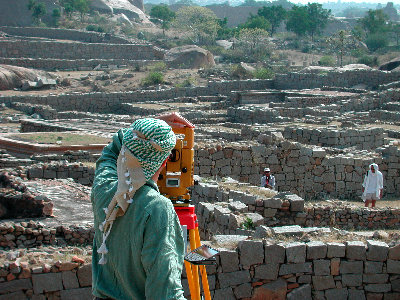iMahal Interview Series:
David Gimbel
July 22, 2001
iMahal:
Using computers, and the Internet, Archaeos plans to educate the public about archeology using its website. How soon will the website offer a shared real-time archeology experience?
 Gimbel:
That is at least several years away for a couple of reasons. One is the actual cost of doing it. We operate on a shoestring budget, and I'm scrambling to raise cash all the time. But the other is just the logical question: Is the technology there to do this? To enable a real-time view what you basically need is a stable communication connection, such as GSM. GSM is the type of cellular communication that is standard throughout most of the world, but which America doesn't use for reasons relating to the lobbying power of its telecommunications monopolies. You need a conduit for the data. You need to constantly send that out in a datastream that can be downloaded somewhere else and then used. The other thing you need is a lot of bandwidth, because when you are talking about three-dimensional data and about photographic and video data, you need to transport a lot of information.
Gimbel:
That is at least several years away for a couple of reasons. One is the actual cost of doing it. We operate on a shoestring budget, and I'm scrambling to raise cash all the time. But the other is just the logical question: Is the technology there to do this? To enable a real-time view what you basically need is a stable communication connection, such as GSM. GSM is the type of cellular communication that is standard throughout most of the world, but which America doesn't use for reasons relating to the lobbying power of its telecommunications monopolies. You need a conduit for the data. You need to constantly send that out in a datastream that can be downloaded somewhere else and then used. The other thing you need is a lot of bandwidth, because when you are talking about three-dimensional data and about photographic and video data, you need to transport a lot of information.

|
|
Surveying the Nobleman's Quarters
|
I think one of the things we're seeing is that bandwidth is increasing for everybody. Eventually we're all going to have huge data pipes entering our offices and apartments that carry tremendous amounts of data to us in real time. We're already seeing this on the Web. As soon as you get any kind of broadband, DSL or cable modem, you start seeing streaming video clips. For the first time what you realize is that television is dying. What's going to replace it is the computer; the two are merging.
For Archaeos, the major questions about this communications evolution are more pragmatic: How are we going to bring the information that we are collecting through our research to broader audiences? Will people find what we are doing exciting, and will we be able to grow as an organization that can financially support new technology? Or will people say, "hey, this is not interesting," or "we'd rather fund something else." That's question number one.
And question number two is: how quickly will the technology be there in any meaningful way? At a place like Vijayanagara, it would be impossible to send large quantities of data directly back home and it will be impossible for a long time because the topography is such that you can't get GSM reception. Until some company sets up a series of communications relays there's no way to send the datastream out. You can take your GSM phone and it will work almost anywhere in India, but as soon as you get near all these weird metamorphic rock formations at Vijayanagara, that's it, you don't have a datastream anymore. Landline connections may eventually be more plausible there. One of the stunning things about India is that you can be in a place as remote as Vijayanagara, sitting in the shade of a 15th century temple which is still in active use, and nearby are restaurants, souvenir shops, and probably a few Internet cafes. It's an incredible paradox in the sense that it's this mixture of things that are absolutely ancient and technologies that are absolutely current.
Another issue in a lot of places is: will the government allow it? India is a democracy and doesn't set the same constraints upon communication as military regimes do. You couldn't do this in Syria, in Iraq, or in a lot of other places. Often they won't even let you have a cellphone. Even less probable is that you would be granted permission to use any kind of Internet connection. Totalitarian states don't want communications to be universally accessible, nor do they want information to be easily distributed. They don't want people to have access to any kind of media, or to information that they don't control.
|
..India .. it's actually more democratic than the United States..
|
One of the reasons I love working in India is that it is a democracy. Almost anything goes. In a lot of ways it's actually more democratic than the United States.

All photographs copyright and courtesy of David Gimbel or Archaeos




